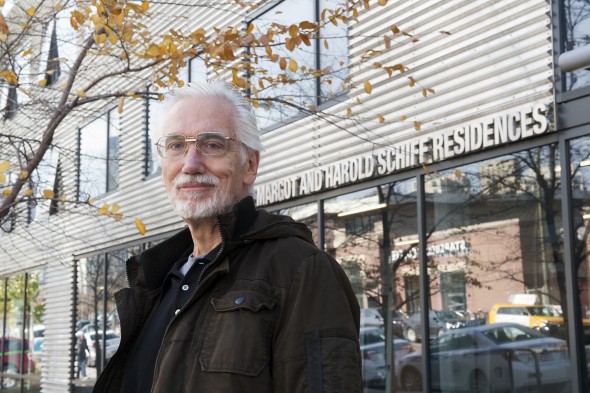Charlie Hoch makes plans for affordable housing

Charlie Hoch, professor of urban planning and policy, is on the board of Lakefront Supportive Housing. “We build affordable housing mainly for low-income families, and have expanded to seniors and the homeless,” he says. Photo: Roberta Dupuis-Devlin/UIC Photo Services
Charlie Hoch, who just won an award for his work on homelessness, is a firm believer in planning.
“I am a planning machine,” Hoch (rhymes with coke) declares on his LinkedIn page.
“I eat and sleep planning. I am still not bored with this activity.”
But Hoch, a professor of urban planning and policy in the College of Urban Planning and Public Affairs, knows that everything has its limits.
“I do not plan everything,” he says. “I plan for the future when we do not know what will happen and worry that things may not turn out well.
“Plans help us prepare, not predict.”
Fifteen years ago he joined the board of Lakefront Supportive Housing, the largest developer — 1,500 units — of affordable supportive housing in the Midwest.
He helped plan and guide a merger with Mercy Housing, a national nonprofit housing developer, in 2005.
“We build affordable housing mainly for low-income families, and have expanded to seniors and the homeless,” he said.
The former Hotel Moreland at Argyle Street and Sheridan Road in Chicago’s Uptown neighborhood, renamed the Hotel Washington after the late Mayor Harold Washington, is an example.
“It was falling apart and needed a lot of repairs,” Hoch said. “It was converted into supportive housing.”
As this was going on in the ’80s, Ed Meese, President Reagan’s attorney general, was famously asserting that ketchup is a vegetable — an excuse for cutting federal lunch subsidies and part of a movement to withdraw funds from the needy.
“I am not a fan of that approach,” Hoch said drily.
“At the time, we were witnessing increasing numbers of people on the streets in Chicago. Before, it had been restricted to certain neighborhoods; now it was across the city.”
He did a study of residents in hotels that became a book, New Homeless and Old: Community and the Skid Row Hotel.
“The story of the book was, ‘Hey, you guys think the new homeless are different from the old, but it’s pretty much the same problem,’” he said.
Some 40,000 to 50,000 people lived in these hotels in the vicinity of the Loop.
“If you’re living there you’re saying, ‘I don’t get much space, but I’m well served by my location in the city,’” Hoch said.
Residents tended to be single, “with no children because these were tiny rooms,” he said.
“We don’t have enough of this kind of housing, and with the codes for minimum square footage it’s pretty much impossible to build more.”
What’s different these days is the care available to residents in supportive housing, who include veterans suffering from post-traumatic stress disorder and people with injuries, disabilities, mental illness and drug addiction.
“The population is huge,” as high as 300,000, all unemployed and not part of a family, Hoch said.
“These people don’t say, ‘I’m homeless.’ They say, ‘I’m Charlie, I’m an addict and I’m going to change my ways’ or ‘I’ve been in prison and I need a break.’”
Few in the private sector can build anything that will rent for $50 a month.
“And you’re not allowed to make your own housing like in Rio or Caracas,” Hoch said. “Build a tent city and the police come in and break it up.”
But when it comes to the sort of units that Mercy Housing is building, “the great thing is that people get permanent housing and help for their problems,” he said.
“If you care about reducing suffering and improving the security of people with very low income, this fits the bill.”
Hoch was born in Minneapolis but spent much of his childhood in Dallas, Fort Worth and San Diego.
“My dad was in aerospace and so we bumped around to different places,” he explained.
Hoch studied to be a priest for five years.
“They sent me to Rome,” he said. “I saw it was not for me, but I learned about cities.”
He earned a bachelor’s degree at the University of San Diego, a master’s at San Diego State University and a doctorate at UCLA.
He was a program coordinator and director of urban studies and planning at Antioch University Los Angeles and an assistant professor at Iowa State University before coming to UIC in 1981.
He lives in Oak Park with his wife, Susan Stall, the retired chair of sociology at Northeastern Illinois University and co-author of The Dignity of Resistance, about women in the Wentworth Gardens public housing project.
They have a daughter, Gina, 26, a dancer in Philadelphia.
On Oct. 9, Hoch received the Mercy Housing Spirit of Mercy Award.
His work on homelessness is “not only my profession but a big part of my civic engagement,” he said.
“We make the places we live in. We can actively design places for a purpose.”
